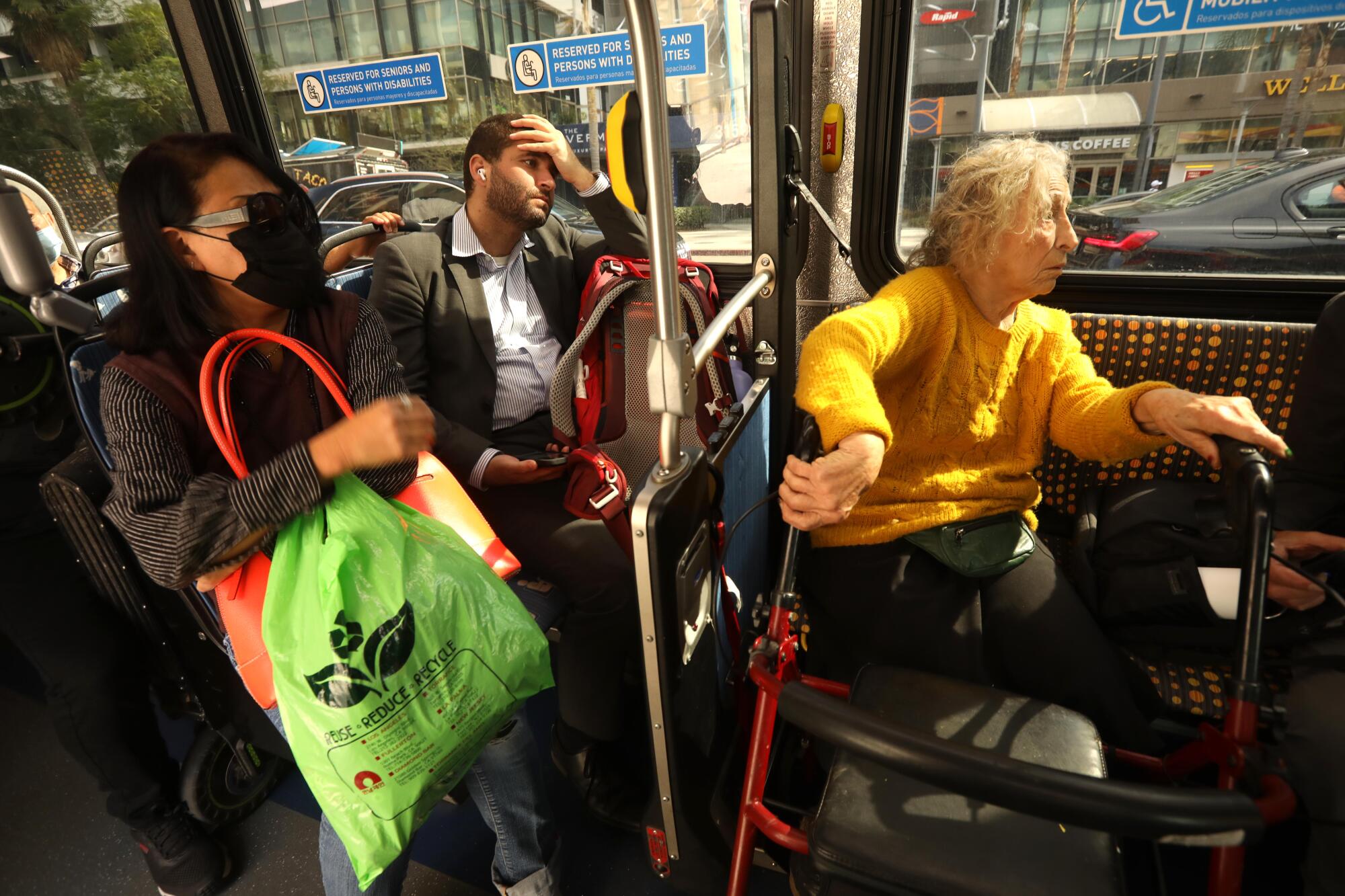
- Share via
The woman sat near the front of the bus with a red-framed walker at her feet and a look of discomfort on her face. As the L.A. Metro 720 approached MacArthur Park from the west on Wilshire Boulevard, she reached with her right hand for the back of her neck and grimaced.
“Are you OK?” I asked.
“It hurts,” she said, massaging the sore spot.
Another passenger had a bad cough and a wretched demeanor. He cursed the driver for stopping to help a disabled passenger maneuver his three-wheeled scooter. He cursed the disabled man, too, who had a scar at the back of his neck, suggesting a surgical incision. Then he hacked some more.
The woman did not look at him, following the standard code of safe travels on public transit — mind your own business and avoid confrontation.
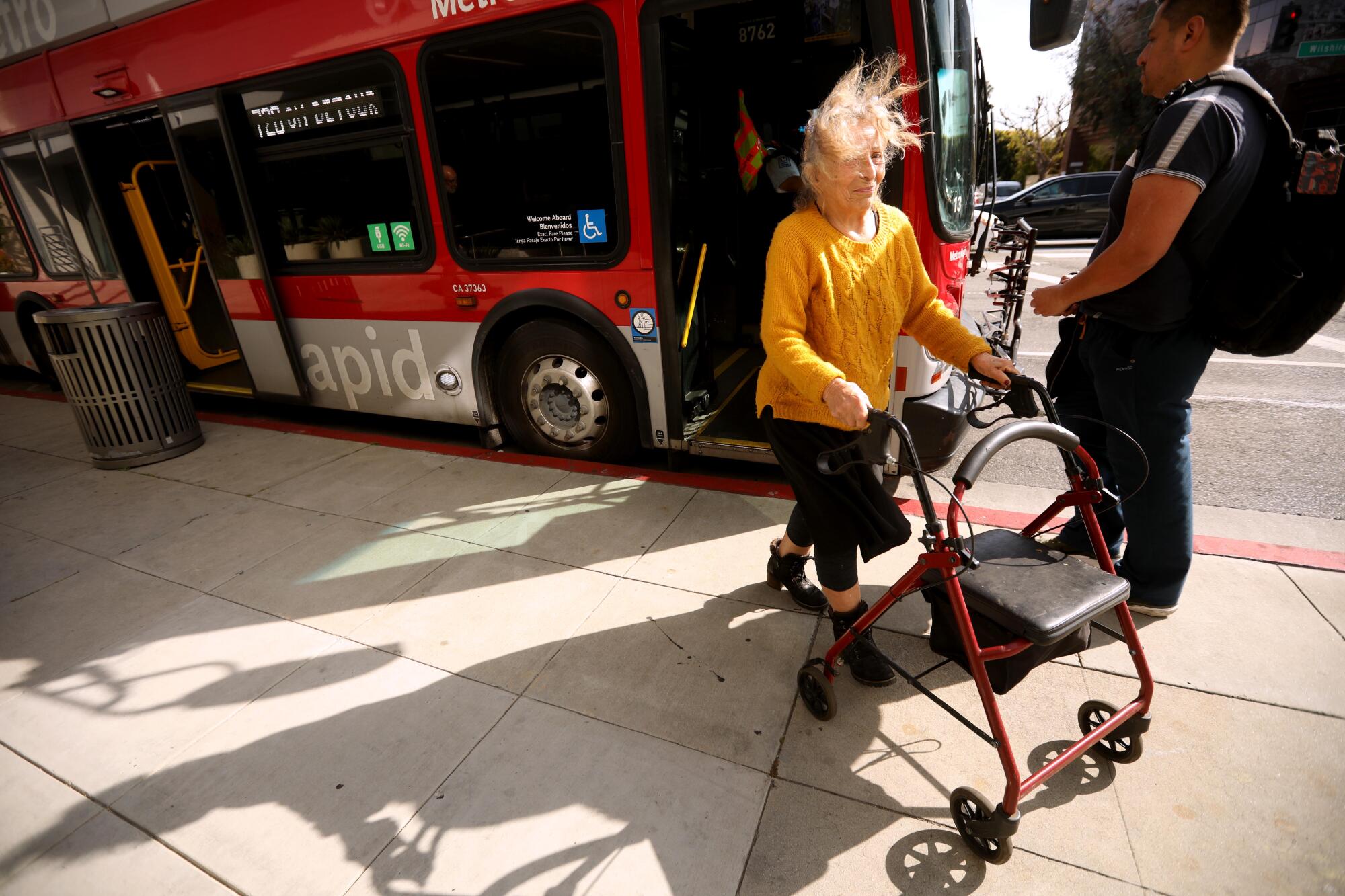
Dressed in a mustard-colored sweater, black skirt and stylish black boots, the woman got off the bus at Alvarado Street and pushed her walker through the urban kaleidoscope of MacArthur Park. Vendors crowded the sidewalks. Proselytizers on megaphones preached salvation. Police on horseback clip-clopped into the park. Subway riders rose up from the bowels of the city like rabbits. The spring air smelled of opportunity and desperation.
It’s a place where you have to watch yourself, but Channah Obadia couldn’t be distracted from her one mission: Get her sister Mehri’s cellphone fixed and deliver it to the West L.A. nursing home where Mehri is convalescing. “It works, but the volume is too low,” Obadia told me, and her sister— who had polio as a child — has a hearing problem in addition to some paralysis in her legs.
Obadia said she’d picked up the phone for her sister at the intersection of Wilshire Boulevard and Alvarado Street last year. “It was a government phone,” she explained — a giveaway for low-income qualifiers. But as she studied the warren of vending stalls, she didn’t spot the place she’d acquired it.
California is about to be hit by an aging population wave, and Steve Lopez is riding it. His column focuses on the blessings and burdens of advancing age — and how some folks are challenging the stigma associated with older adults.
“Maybe it was across the street,” Obadia said, scanning the flea market of offerings on the other side of Wilshire Boulevard.
“Señora,” a cellphone vendor called out, asking what she needed and assuming, perhaps, that she spoke Spanish.
Obadia, who came to the U.S. from Iran in 1970 and attends synagogue on Saturdays, answered in English. She handed over the phone to a salesman and waited patiently, the edge of a small green purse visible under the hem of her sweater. She was offered a couple of options to replace the phone with a new one and checked the prices.
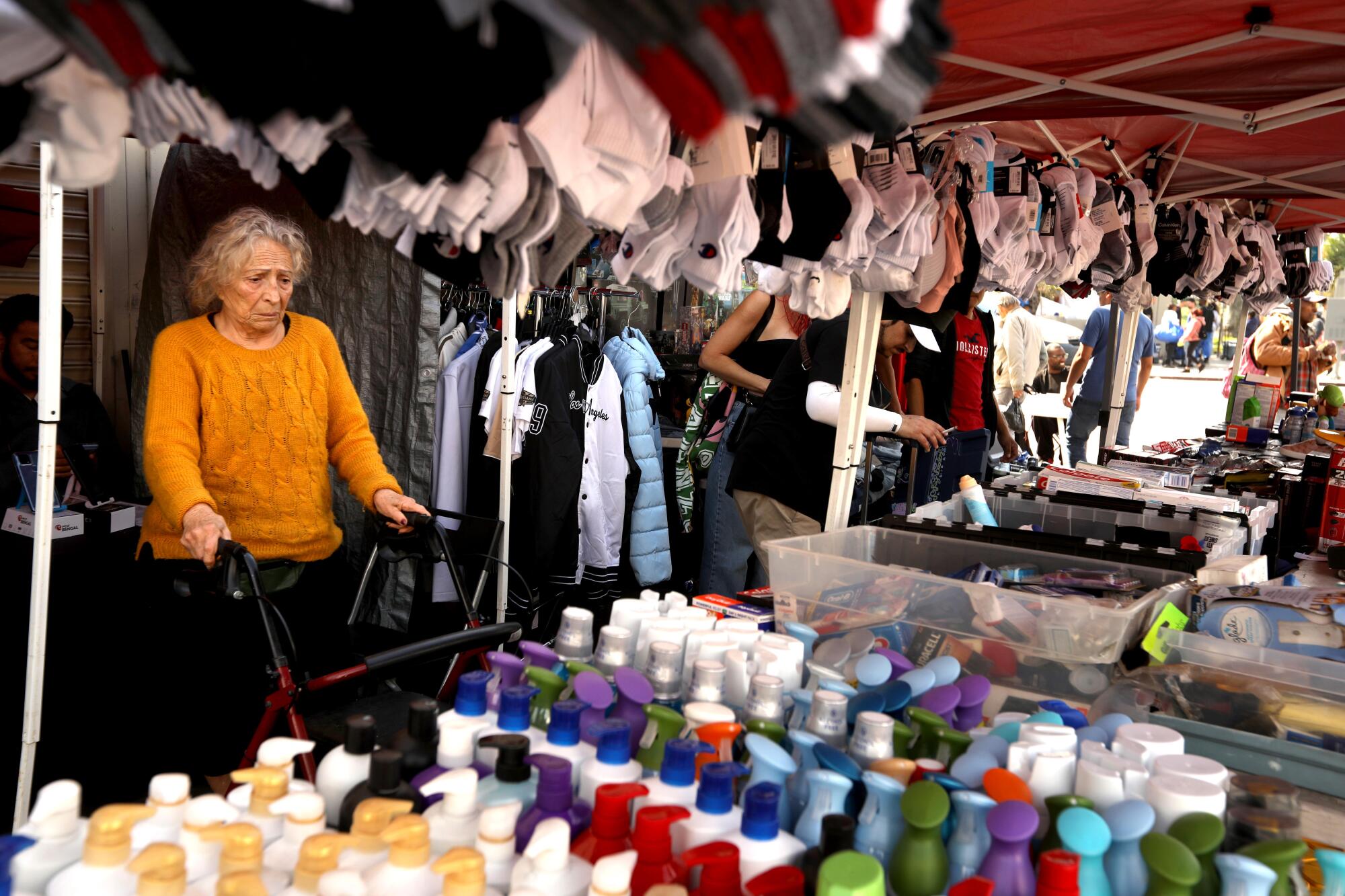
“No,” Obadia said, her feistiness leaving no room for negotiation. “Too much.”
The salesman tried again to figure out how to repair the old phone, or so it seemed, and then gave up and handed it back.
Obadia could have been excused if she’d fumed about all that wasted time. But she took it as just another reality of life for an aging resident of a teeming metropolis. She has dark, penetrating eyes, a fetching smile and an expression that hints at the complexities of life’s wonder and hardship. Obadia first told me she was 86, then reconsidered and settled on 87. “What’s the difference?” she said. “It doesn’t matter.”
She calmly crossed Wilshire, though the don’t-walk sign flashed before her, and waited for the bus back to the Westside, saying she had one more task ahead of her: “I will take a kebab to my sister.”
::
Times photographer Genaro Molina and I had been scouting trains and buses for older commuters when we spotted Obadia. We wanted to find people in their 70s and older going to work because they can’t afford to quit, and we wanted to see if older people felt safe on public transit (fewer than 10% of bus and rail riders are 65 and older, according to Metro statistics).
Those are ongoing projects, but Obadia caught our attention on Wednesday when she reached for her neck and winced. It was a reminder that tasks like getting a phone repaired and navigating a traffic-clogged city can turn into an endurance test. The city is not designed for people of her age group, especially those with mobility or physical challenges. Obadia has hearing aids, but in the presence of competing noises she sometimes struggles with conversations.
In a matter of minutes, a westbound 720 bus arrived. We boarded together, and Obadia explained the pain in her neck. A disc problem had flared, so she got a steroid injection to numb the pain, but the needle missed the spot and she needed follow-up treatment.
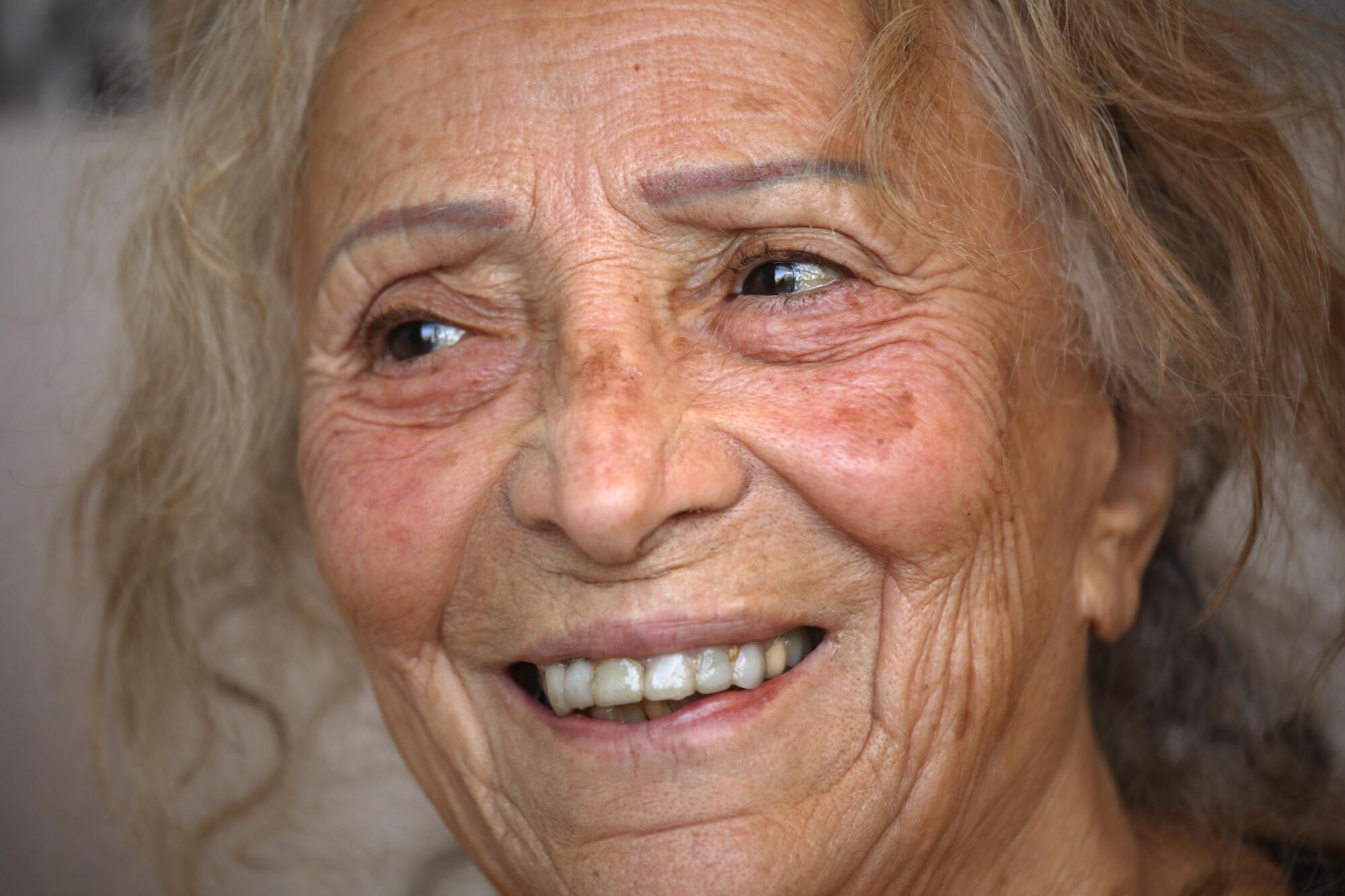
“This is life. What can you do?” she said, citing Duchess Kate Middleton’s recent announcement that she’s fighting cancer. Obadia said she, too, had cancer several years ago but is fine now. “It’s sad and I feel sorry for her ... you never know what will happen tomorrow.”
When I asked Obadia if she always traveled by bus, she said no. She drives a Mazda, but gas is expensive and she doesn’t feel comfortable driving long distances, especially with a stiff neck. To start her trip to MacArthur Park, she had driven from her home to the bus stop near La Cienega and boarded the 720. She just started using the walker, which has helped with the neck and back pain. But getting it folded and into and out of the car is a bit like handling a pet alligator, and pushing it onto and off of buses takes some doing.
Obadia said she doesn’t feel unsafe or uncomfortable on transit — in fact, she said, it’s a relief to leave the driving to someone else.
“I never think about that,” Obadia said, but then she recalled an unpleasant experience. “You know, there are a lot of crazy people. One of them came one night on the bus with a container of poo. He looked at everybody to see their reaction. ... Nobody said anything.”
When we got to her bus stop, Obadia used her walker to lead us to her Mazda and then drove us south on Robertson Boulevard in stop-and-go traffic, heading to the kebab restaurant. Only later would she admit that she doesn’t feel nervous when driving alone but worried about the welfare of the two passengers in her hands.
Along the way, Obadia explained that she was living in Iran when she met an American visitor. They married and raised a son in Los Angeles, but the marriage did not work out and her ex later died.
Obadia pulled up to Kabob by Faraj on Pico, a restaurant and kosher meat market. She placed an order, and we waited at a table for what turned out, for me and Molina, to be a surprise.
Obadia had ordered beef kebab dinners for each of us.
“You are my guests,” she said.
She reached across the table to sprinkle an entire packet of seasoning on my steak slices and offered a minor critique of the platters we’d been served. “At home, I cook rice. Here, they charge for rice, “ Obadia said. “I don’t pay.”
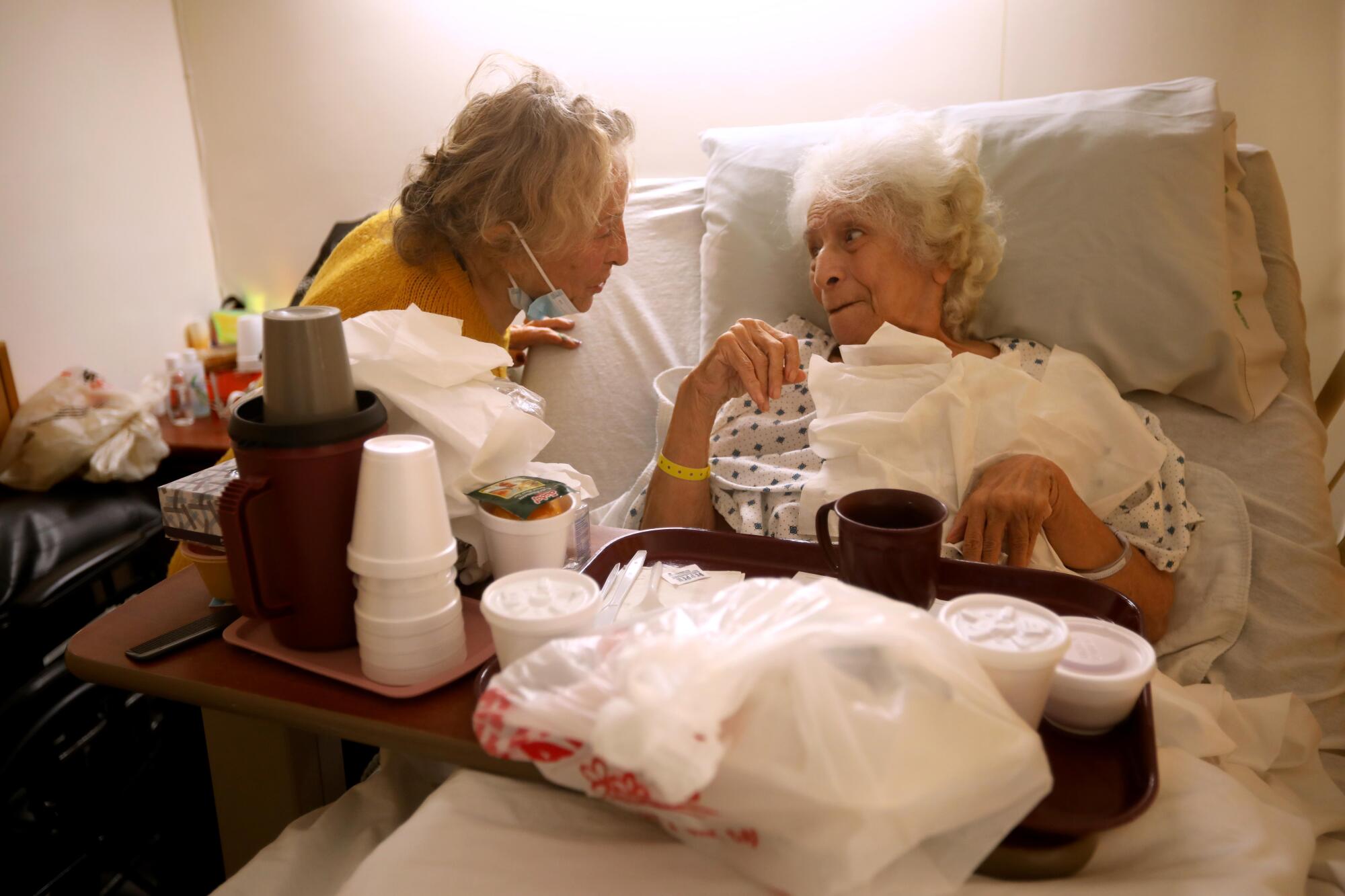
Halfway through the meal, Obadia ordered a fourth kebab to go, and soon, we were on our way to deliver dinner to her sister, Mehri Faridzand.
The nursing home was institutional and dated, inside and out, as if intentionally drab. But the staff were friendly, and 80-year-old Faridzand — whose hair was beautifully coiffed — greeted her sister and the kebab dinner with a smile. Obadia leaned in close, and the sisters spoke in Persian.
They had been living together, Obadia said, and she was essentially her sister’s caretaker. Not long ago, she added, she still felt strong and up to the task. But Mehri’s increasingly limited mobility was too much for Obadia, who thinks she injured her neck and back trying to help her sister get up and down and around the house.
Obadia spends much of her days managing their affairs now and arm-wrestling with bureaucracies. She said she had a tax matter to settle, and she’s trying to sort ongoing issues with Social Security and Medicare. And then there’s her own health to consider, with possible upcoming surgery for her neck problem.
“I think I am more sick than her,” Obadia told me in the hallway outside her sister’s room. “Believe me, I have a lot of pain. It’s very hard for me to walk.”
And yet, I told her, she seems to be a woman of great resolve.
“Listen,” she said, “do I have other choices?”
Two days later, I visited Obadia at her home and brought her some flowers as a thank-you for dinner.
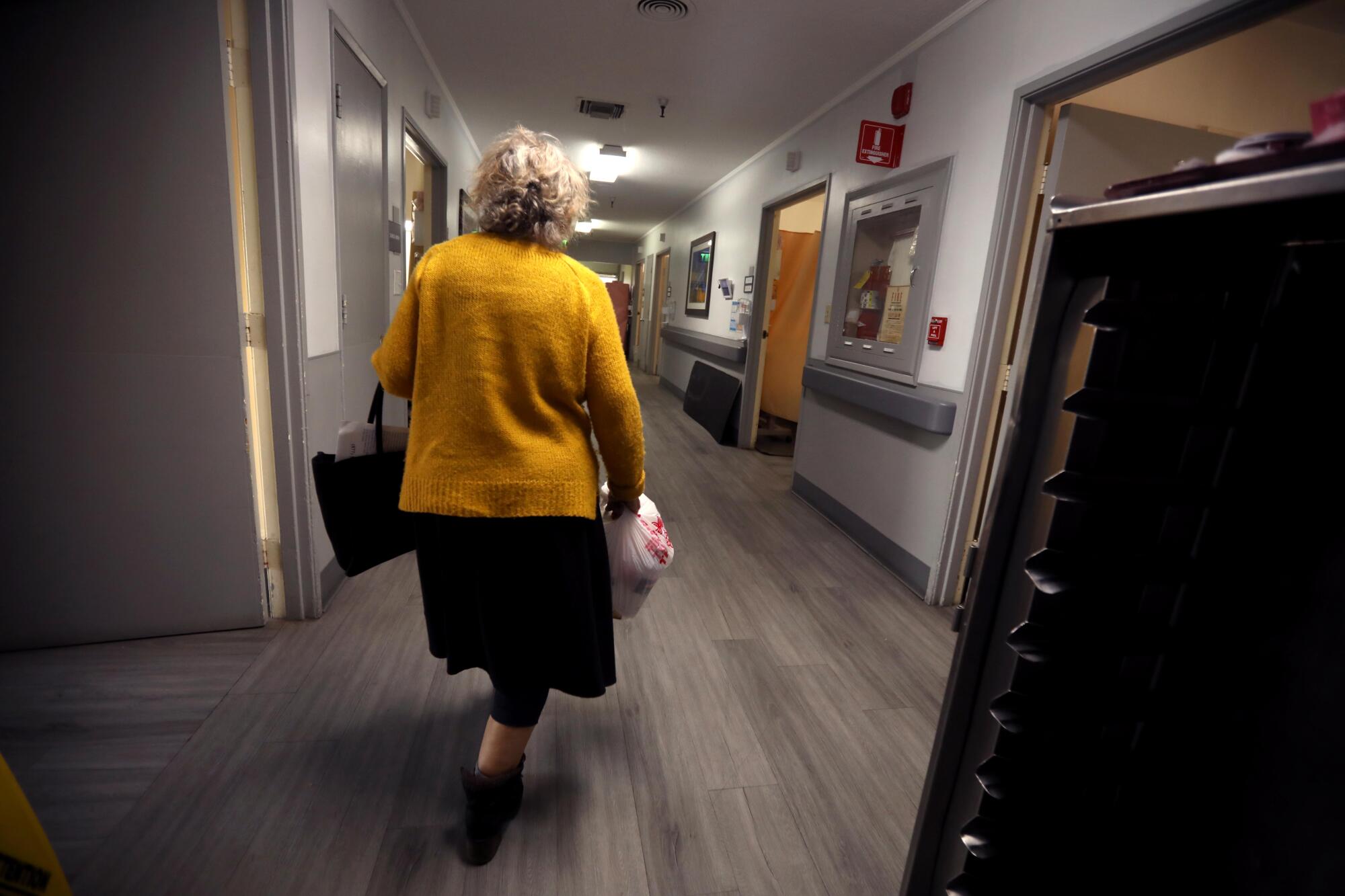
“Why?” she asked, thanking me as she set the vase on a table in the living room.
She wore a back brace and was waiting for a ride to physical therapy. I asked if I could see Mehri’s phone. I’m no tech genius, but I thought I’d give it a try. I hadn’t trusted that the people in MacArthur Park wanted to do anything other than sell her a new phone. I futzed a bit and found a volume control that was dialed down, so I made an adjustment and asked Obadia to call her sister’s phone.
She took hold of her own phone and dialed.
Her sister’s phone rang in my hand, loud and clear, and Obadia flashed that fetching smile.
One problem solved, and on to the next.
More to Read
Sign up for Essential California
The most important California stories and recommendations in your inbox every morning.
You may occasionally receive promotional content from the Los Angeles Times.












